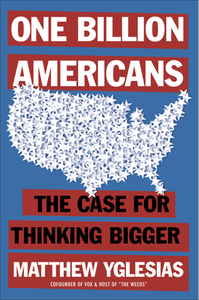Take a photo of a barcode or cover
I went for the five stars because i think the book is concise in its argument and has humorous anecdotes. I'm familiar with the author from the weeds podcast and it's entertaining to hear his voice as I read.
The argument that we need one billion American in order to stay a global superpower makes sense to me and hearing the proposed solutions were pretty inspiring. While it seems utopian, there is hope. It definitely got me thinking how I'd plan to have more kids if the policies and money are right.
The argument that we need one billion American in order to stay a global superpower makes sense to me and hearing the proposed solutions were pretty inspiring. While it seems utopian, there is hope. It definitely got me thinking how I'd plan to have more kids if the policies and money are right.
For the record, I’d give this book 3.5 stars.
‘One Billion Americans’ by Matt Yglesias outlines an argument for increasing the US population through immigration and increased birthrate. I’m sympathetic to this argument, and I think the book does a good job of covering all the pro-population increase arguments. However, in my opinion, it doesn’t engage as much as it could with anti-increase arguments. More importantly than dismissing existing arguments (which are mostly poorly constructed anyway) the book only shallowly investigates potential downsides of population growth that are not necessarily brought up in current debates. Generally, I felt like this would have been an excellent magazine length article, but it was extended to book length and got a bit diluted in the process (it’s still a very quick read). That said, I do think this is a solid piece of advocacy, as opposed to deeper scholarship, and succeeds in that purpose.
If you’ve read my other reviews (unlikely, I know), you will know that I tend to prefer deep scholarship over journalism. This is a preference of mine, and my reviews reflect that, but should not be seen as necessarily a bad thing. Journalistic writing tends to be far more accessible to most people than academic oriented work. This is a good thing, and my opinions should be understood within the context of my own preferences rather than as some kind of universal.
‘One Billion Americans’ by Matt Yglesias outlines an argument for increasing the US population through immigration and increased birthrate. I’m sympathetic to this argument, and I think the book does a good job of covering all the pro-population increase arguments. However, in my opinion, it doesn’t engage as much as it could with anti-increase arguments. More importantly than dismissing existing arguments (which are mostly poorly constructed anyway) the book only shallowly investigates potential downsides of population growth that are not necessarily brought up in current debates. Generally, I felt like this would have been an excellent magazine length article, but it was extended to book length and got a bit diluted in the process (it’s still a very quick read). That said, I do think this is a solid piece of advocacy, as opposed to deeper scholarship, and succeeds in that purpose.
If you’ve read my other reviews (unlikely, I know), you will know that I tend to prefer deep scholarship over journalism. This is a preference of mine, and my reviews reflect that, but should not be seen as necessarily a bad thing. Journalistic writing tends to be far more accessible to most people than academic oriented work. This is a good thing, and my opinions should be understood within the context of my own preferences rather than as some kind of universal.
Yglesias is a pundit and a policy nerd, and if you've ever enjoyed one of his extended rants on The Weeds, you pretty much know what to expect here.
Do not expect a deep dive on any of your most serious concerns with this plan (he does a pretty elegant job of both acknowledging the reality of climate change, and then handwaving it away).
But when it comes down to it, this is a book about big, interesting, mostly pretty plausible ideas, some of which I was pretty excited about by the end.
Do not expect a deep dive on any of your most serious concerns with this plan (he does a pretty elegant job of both acknowledging the reality of climate change, and then handwaving it away).
But when it comes down to it, this is a book about big, interesting, mostly pretty plausible ideas, some of which I was pretty excited about by the end.
This book puts aside culture war and special interest politics (from both parties) in favor of practical policy that would provide tangible benefit for all Americans. An enlightening and inspirational read.
Solid case that we should pick all the low-hanging fruit we can
Thought-provoking and easy-to-read presentation of a proposal I haven't ever really considered seriously. Given the overall simplicity of the presentation, a lot of ideas inside beg for follow-up discussion, including the motivating premise that it's essential for the U.S. to stay number one economically, but I think he lays the framework for broader discussion, and does so in a way that a non-expert like me can digest in just an afternoon.
The main point is fresh and at least on the surface compelling -- making the US more populous has been a key to our strength historically and will be needed to continue to remain the largest global economy. The arguments for which policies will make it happen are weaker; child-friendly policies sound great but there's no evidence showing that it actually moves the needle on birthrates significantly, and the case on immigration is stronger but lacks grounding in how much would actually be needed to accelerate population growth and how that compares to current levels.
I didn't learn much that I hadn't seen before, but having heard a lot of podcasts and other stuff around the book already I may not have a fair perspective. It's written in basically a Vox article style, which didn't work well for me as a full book, and it was sloppier than most books. The question I would have liked to see explored is, is what matters how many "Americans" there are, or how many people in the American sphere? (More than a billion people already live in the West where they buy a lot from American companies, import a lot of American culture, are influenced by American institutions, etc.)
I didn't learn much that I hadn't seen before, but having heard a lot of podcasts and other stuff around the book already I may not have a fair perspective. It's written in basically a Vox article style, which didn't work well for me as a full book, and it was sloppier than most books. The question I would have liked to see explored is, is what matters how many "Americans" there are, or how many people in the American sphere? (More than a billion people already live in the West where they buy a lot from American companies, import a lot of American culture, are influenced by American institutions, etc.)
informative
inspiring
medium-paced
informative
fast-paced



